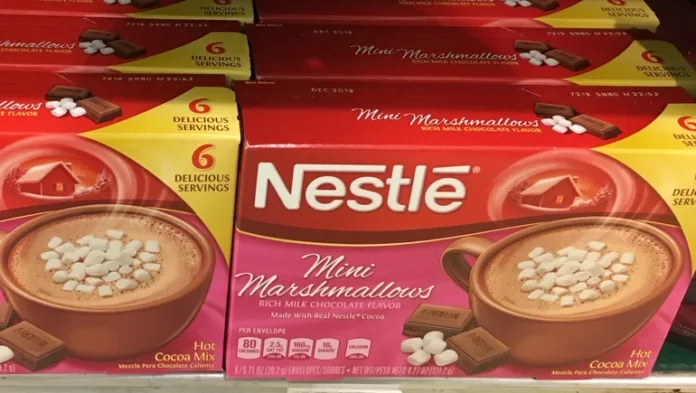Nestlé, the world’s largest food producer, has positioned itself as largely “immune” to the impact of tariffs, according to Chief Executive Officer Laurent Freixe. This resilience is attributed to the company’s strategic decision to maintain a localized manufacturing footprint, which allows Nestlé to better navigate the challenges posed by global trade dynamics. During a recent press conference, Freixe highlighted that the majority of products sold by Nestlé are produced within the markets they serve. For instance, approximately 90% of the items sold in the United States are manufactured domestically.
Freixe emphasized the company’s “unique, privileged position,” which he believes fortifies Nestlé against significant fluctuations in the marketplace. His remarks followed the release of the company’s fourth-quarter earnings, underscoring Nestlé’s robust operational strategy amidst ongoing global trade uncertainties.
Food and beverage manufacturers, including competitors like Coca-Cola, are closely monitoring the implications of tariffs introduced during the Trump administration. Coca-Cola’s CEO, James Quincey, has indicated that the company might consider switching from aluminum cans to plastic bottles if the costs of commodities rise excessively. In contrast, Nestlé’s approach involves implementing various measures to mitigate the effects of tariffs, according to Chief Financial Officer Anna Manz. She noted that the company has multiple strategies in place, including adjustments in pricing and sourcing, to counter any tariffs that may emerge.
Manz further explained that Nestlé’s guidance for 2025 does not take into account potential tariff impacts, expressing uncertainty about future trade policies. She cautioned that any newly imposed duties could quickly escalate the inflationary pressures that the consumer packaged goods (CPG) sector is already experiencing. Many businesses have resorted to raising prices as a response to increased operational costs, yet such actions have resulted in consumers reducing their purchases or opting for private label and innovative brands.
Despite its strategic advantages, Nestlé has faced challenges in attracting consumers back, particularly in frozen food categories such as pizza. The company has initiated pricing reductions and quality improvements in the U.S. market to reclaim customer loyalty. Additionally, Nestlé plans to implement further price increases for cocoa and coffee due to record-high market prices. Manz indicated that the extent of these price hikes would be guided by consumer response, noting that both coffee and cocoa are resilient product categories.
In its recent financial report, Nestlé announced that organic sales for 2024 increased by 2.2%, a notable decline from the 7.2% growth observed in the previous year. Total sales fell to $101 billion (91,354 billion Swiss francs) from $103 billion in 2023. The performance in North America, which accounts for over a quarter of Nestlé’s overall sales, was labeled as “disappointing” due to underperformance in coffee creamers and frozen foods. The latter was particularly affected by supply constraints, an issue that the company anticipates will improve with the opening of a new beverage plant in Arizona.
Nestlé remains optimistic about its future performance, forecasting an improvement in organic sales growth throughout the year as it implements recent strategic initiatives. Early indications show a strengthening in sales growth, with a rise from 2.1% in the first half of 2024 to 2.3% in the latter half. Freixe expressed confidence in the company’s direction, stating, “We are starting [to invest] in our growth platform, in our innovation big bets, and the organization is aligned and moving in the right direction.” He acknowledged that while progress may take time, Nestlé is committed to advancing its operations at an accelerated pace.
In November, Nestlé announced a plan to achieve at least $2.8 billion in cost savings by 2027, with intentions to reinvest these savings into various business sectors. Initially, there were discussions about separating its waters and premium beverages segment into a standalone entity; however, Freixe clarified that the company has no intention of selling this division at present. This segment, which includes well-known brands like Perrier and Sanpellegrino, accounts for nearly 4% of Nestlé’s global sales and has faced recent challenges. Nevertheless, Freixe mentioned that the company remains open to the possibility of divesting part of this business or entering into strategic partnerships.
In conclusion, Nestlé has demonstrated resilience in the face of global trade challenges, leveraging its localized production strategy to mitigate tariff impacts. While the company acknowledges the pressures of inflation and consumer behavior changes, it remains focused on innovation and strategic growth, positioning itself for continued success in the competitive food and beverage industry.


